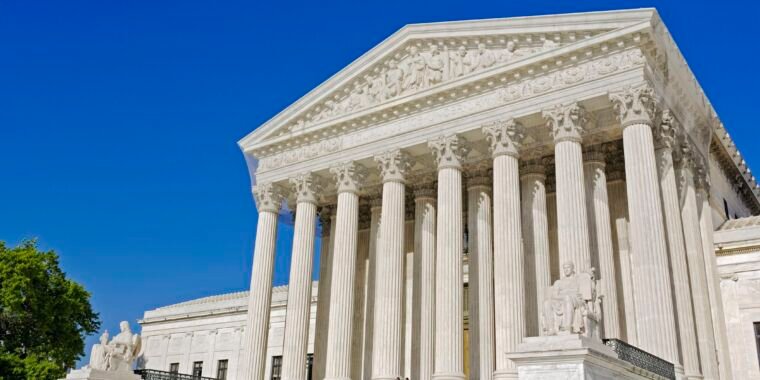Getty Images | Rudy Sulgan
This article originally appeared on Inside Climate News, a nonprofit, independent news organization that covers climate, energy, and the environment. It is republished with permission. Sign up for its newsletter here.
Among the many obstacles to enacting federal limits on climate pollution, none has been more daunting than the Supreme Court. That is where the Obama administration’s efforts to regulate power plant emissions met their demise and where the Biden administration’s attempts will no doubt land.
A forthcoming study seeks to inform how courts consider challenges to these regulations by establishing once and for all that the lawmakers who shaped the Clean Air Act in 1970 knew scientists considered carbon dioxide an air pollutant, and that these elected officials were intent on limiting its emissions.
The research, expected to be published next week in the journal Ecology Law Quarterly, delves deep into congressional archives to uncover what it calls a “wide-ranging and largely forgotten conversation between leading scientists, high-level administrators at federal agencies, members of Congress” and senior staff under Presidents Lyndon Johnson and Richard Nixon. That conversation detailed what had become the widely accepted science showing that carbon dioxide pollution from fossil fuels was accumulating in the atmosphere and would eventually warm the global climate.
The findings could have important implications in light of a legal doctrine the Supreme Court established when it struck down the Obama administration’s power plant rules, said Naomi Oreskes, a history of science professor at Harvard University and the study’s lead author. That so-called “major questions” doctrine asserted that when courts hear challenges to regulations with broad economic and political implications, they ought to consider lawmakers’ original intent and the broader context in which legislation was passed.
“The Supreme Court has implied that there’s no way that the Clean Air Act could really have been intended to apply to carbon dioxide because Congress just didn’t really know about this issue at that time,” Oreskes said. “We think that our evidence shows that that is false.”
The work began in 2013 after Oreskes arrived at Harvard, she said, when a call from a colleague prompted the question of what Congress knew about climate science in the 1960s as it was developing Clean Air Act legislation. She had already co-authored the book Merchants of Doubt, about the efforts of industry-funded scientists to cast doubt about the risks of tobacco and global warming, and was familiar with the work of scientists studying climate change in the 1950s. “What I didn’t know,” she said, “was how much they had communicated that, particularly to Congress.”
Oreskes hired a researcher to start looking, and what they both found surprised her. The evidence they uncovered includes articles cataloged by the staff of the act’s chief architect, proceedings of scientific conferences attended by members of Congress, and correspondence with constituents and scientific advisers to Johnson and Nixon. The material included documents pertaining not only to environmental champions but also to other prominent members of Congress.
“These were people really at the center of power,” Oreskes said.
When Sen. Edmund Muskie, a Maine Democrat, introduced the Clean Air Act of 1970, he warned his colleagues that unchecked air pollution would continue to “threaten irreversible atmospheric and climatic changes.” The new research shows that his staff had collected reports establishing the science behind his statement. He and other senators had attended a 1966 conference featuring discussion of carbon dioxide as a pollutant. At that conference, Wisconsin Sen. Gaylord Nelson warned about carbon dioxide pollution from fossil fuel combustion, which he said “is believed to have drastic effects on climate.”
The paper also cites a 1969 letter to Sen. Henry “Scoop” Jackson of Washington from a constituent who had watched the poet Allen Ginsberg warning of melting polar ice caps and widespread global flooding on the Merv Griffin Show. The constituent was skeptical of the message, called Ginsberg “one of America’s premier kooks” and sought a correction of the record from the senator: “After all, quite a few million people watch this show, people of widely varying degrees of intelligence, and the possibility of this sort of charge—even from an Allen Ginsberg—being accepted even in part, is dangerous.”
Source link
